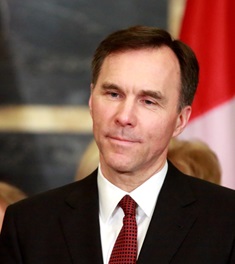The National Association of Federal Retirees is pleased yesterday's federal budget includes key improvements for veterans and investments for seniors.
On February 21, in collaboration with the Canadian Coalition for Retirement Security (CCRS) and the Manitoba Seniors Coalition, the National Association of Federal Retirees submitted a written brief to the Manitoba government as part of their public consultation, “T
‘Tis the season – budget season! During the spring months, Canada’s federal, territorial and provincial governments are hard at work crunching numbers, fine-tuning policies and programs, and churning out budgets that will shape where we live, retire and play.
The Office of the Superintendent of Financial Institutions (OSFI) released Actuarial Study No. 18: Canada Pension Plan Actuarial Adjustment Factors. This report found that the legislated contribution rate of 9.9% is sufficient to sustain the Canada Pension Plan financially over the long term.
Federal Retirees, CARP and Réseau FADOQ have joined forces to urge the Trudeau government to take action on discriminatory measures in the 2021 federal budget.
On December 11, Federal Retirees Branch President Michael Walters responded to a holiday opinion piece from Hamilton-area Member of Parliament, Filomena Tassi, appearing in the
If you look through the federal government’s annual reports about our members’ pensions, you’ll quickly realize they are not the gold-plated pensions often described. However, one statistic may jump out at you: the gap in pension averages between our male and female members.
As budget season continues, two more provinces and territories released their budgets in late February 2020.
At the end of each year, the Treasury Board provides the Association with information on the pension indexing increase that is effective on January 1st.
The pension indexation rate effective January 1, 2019, is 2.2%.
Association president Jean-Guy Soulière calls for timely Phoenix compensation for frustrated retired public servants.
On December 1, Federal Retirees Director of Advocacy and Canadian Coalition for Retirement Security chair Sayward Montague wrote to Finance Minister Bill Morneau about Bill C-27.
The recently unveiled Canadian Dental Care Plan is intended to help ease financial barriers to accessing oral health care for eligible Canadian residents.
The Ontario Securities Commission (OSC) has developed a strategy and action plan to respond to what they have viewed as the needs and priorities of Ontario seniors.
The federal government has undertaken some new initiatives in the face of COVID-19 and the economic uncertainty that has befallen many Canadians.
On May 15, 2017, the National Association of Federal Retirees submitted its brief on Bill C-27 to Finance Canada.
Last week, media reported that 270,000 veterans of the Canadian Armed Forces, the RCMP and their survivors between 2003 and 2010 have been affected by calculation errors on disability pensions to the tune of $165-million.
Our advocacy team receives regular calls and emails about a viral chain letter falsely claiming that the “Federal Benefit Payment” is a Ponzi scheme.
Since at least 2012, a chain letter has been floating around from email inbox to inbox. It usually starts this way:
On November 10, in collaboration with the Canadian Coalition for Retirement Security (CCRS), the National Association of Federal Retirees submitted a written brief to the Nova Scotia government as part of their public consultation, “Pension Funding Framework Review and other issues affectin
CRA scams can happen by phone, text, mail or email. Watch out for aggressive language and suspicious links or forms demanding personal information.
After months of study, the House of Commons Standing Committee on Human Resources, Skills and Social Development, and the Status of Persons with Disabilities (HUMA) has tabled the report
As the COVID-19 pandemic continues around the world, Russia and Saudi Arabia have been in an oil-price war. Both events bring significant economic insecurity. Millions are under stay-at-home orders, and applications for employment insurance are at an all-time high.
At time when Statistics Canada estimates that 12 per cent of senior families and 28.5 per cent of single seniors qualify as low income — articles continue to be published attacking one of the most cost-effective and proven ways to provide retirement income security: defined benefit plans.
For over a decade, the Canada Pension Plan Investment Board (CPPIB) and the Public Service Pension Investment Board (PSPIB) have adopted an active management strategy, but was this the best course of action?
The latest federal budget has been pitched as a plan to support “fairness for every generation,” with a focus on new housing.
The Public Service Alliance of Canada (PSAC) announced on July 9, 2020 that it had negotiated a $2,500 general damages compensation for all its members employed by the federal public service be
The indexation rate for public service pension plan benefits comes at the end of each year, but how is it calculated, and how does it respond to inflation?
Stakeholders representing health care providers and seniors will be watching closely to see whether the Liberal government will use 2018 to begin crafting a national seniors strategy.
When the House of Commons rose in June 2019, Bill C-27 effectively died on the order paper.
In October 2016, the federal government introduced Bill C-27.
This week, Anita Anand announced that the $1.9 billion non-permitted surplus will be moved from the Public Service Pension Fund to the Consolidated Revenue Fund.
The federal government has outlined its plan to support Canadians hit hard by the COVID-19 pandemic in a new speech from the throne.
Earlier today, National Association of Federal Retirees’ president, Jean-Guy Soulière, and director of advocacy, Sayward Montague, discussed a National Seniors Strategy with members of the House of Commons Standing Committee on Human Resources, Skills and Social Development and the Status of Pers
On December 21, Federal Retirees submitted a pointed letter to the Honourable Navdeep Bains, Minister of Innovation, Science and Economic Development, in response to the government’s “Enhancing Retirement Security for Canadians” consultation.
The federal government has introduced a new claims process for public servants who experienced personal or financial hardships because of the problematic Phoenix pay system.
Alan Freeman, former Globe and Mail finance reporter and Assistant Deputy Minister for Consultations and Communications with the federal finance department under the late Jim Flaherty, reports from the 2015 budget lock-up on behalf of the National Association of Federal Retirees and iPolitics
MPs are expected to continue debating in Parliament proposed changes to what types of pensions federally-regulated employers can provide.
Today, Federal Retirees submitted its budget brief to the government of Ontario, highlighting the urgent need to continue working toward better retirement security and a comprehensive plan for health care that meets seniors’ needs.
At the end of each year, the Treasury Board provides the National Association of Federal Retirees with information on the pension indexing increase that is effective Jan. 1.
The pension indexation rate effective Jan. 1, 2021, is one per cent.
Today, the Canadian Coalition for Retirement Security - comprised of 22 organizations and representing nearly six million working and retired Canadians - announced its campaign to push for legislation to protect the earned pension benefits of publicand private sector employees and retirees.
At the end of each year, the Treasury Board provides the National Association of Federal Retirees with information on the pension indexing increase that is effective Jan. 1.
The pension indexation rate effective Jan. 1, 2020, is two per cent.
Finance Minister Bill Morneau’s Advisory Council on Economic Growth published recommendations to boost Canada’s economy earlier this week, with advice ranging from boosting innovation, to improving skills training, to increasing labour force participation.
National Association of Federal Retirees member Michael Davie and president Jean-Guy Soulière are calling on Members of Parliament to support legislation to address a discrepancy that treats Canadian Armed Forces veterans unequally.
On budget day, we highlig
This fall, members of the House of Commons Finance committee will review recommendations from across the country on what should be included in the 2019 budget.
The Treasury Board has announced the new PSHCP monthly contribution rates.
The Treasury Board has announced the new Public Service Health Care Plan (PSHCP) monthly contribution rates that will come into effect April 1, 2021.
Advocacy coordinator Candace Jazvac asks Conservative Party leader Andrew Scheer about member priorities at the 2019 Manning Networking Conference.
As 2023 dawns, Federal Retirees discusses the political landscape and what it means for the Association’s advocacy goals.
This morning, Federal Retirees President Jean-Guy Soulière attended the Economic Club of Canada’s breakfast to hear remarks f
On Dec. 12, 2019, Prime Minister Justin Trudeau released ministerial mandate letters outlining the policy objectives and challenges each minister will work to accomplish and address.
Does your retirement future look bright?
Demystify retirement with our two-day virtual pre-retirement course featuring certified pension presenter Melody Walz, National Association of Federal Retirees, Tradex and GERAS Centre for Aging Research.
At the end of each year, the Treasury Board provides the Association with information on the pension indexing increase that is effective on January 1st.
The pension indexation rate effective January 1, 2018 is 1.6%.
Alberta Premier Danielle Smith’s plan to leave the Canada Pension Plan and start her own is flawed on many levels.
The federal government has launched an online consultation called #YourBudget in preparation for the tabling of the 2020 federal budget. Prior to this fall’s election, the House of Commons Finance Committee also started its consultation process by collecting written submissions.
The Government of Ontario has committed $100 million over three years for its new dementia strategy, a plan the province committed to developing in last year’s budget.
Since it’s introduction two years ago, Bill C-27 has been sitting on the order paper. While it hasn’t been put through its parliamentary paces, it certainly has not been forgotten.
Monday’s budget, the first in two years, offers Canadians a peek behind the curtain – at the government’s post-pandemic priorities.
National Organization of Retired Postal Workers representative and Canadian Coalition for Retirement Security member, Peter Whitaker, at the November 28 event in Toronto.
Today, National Association of Federal Retirees (Federal Retirees) CEO Simon Coakeley addressed the Senate Finance Committee on the implementation of certain provisions of Bill C-97, the Budget Implementation Act.







